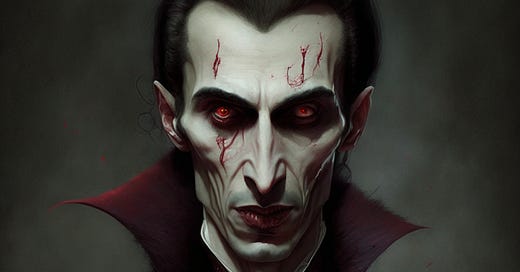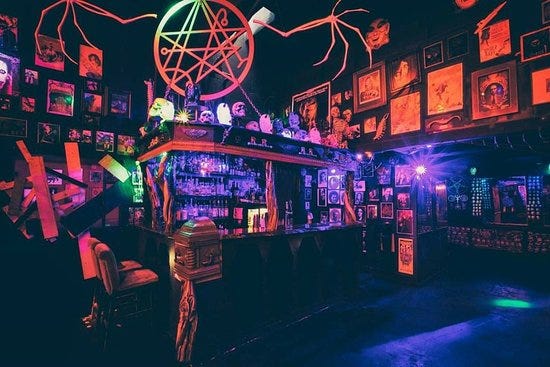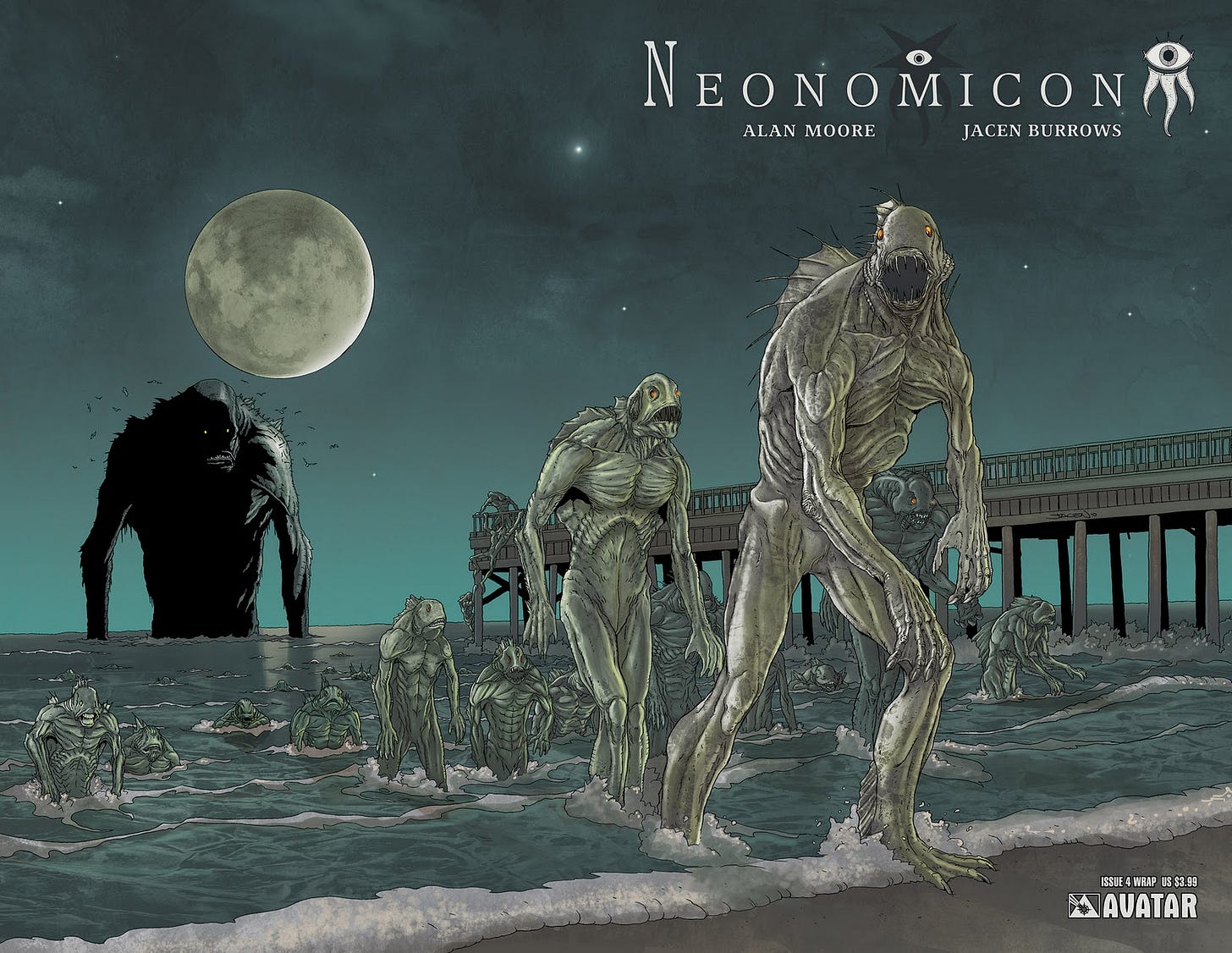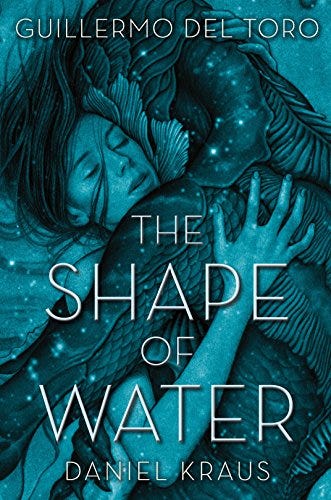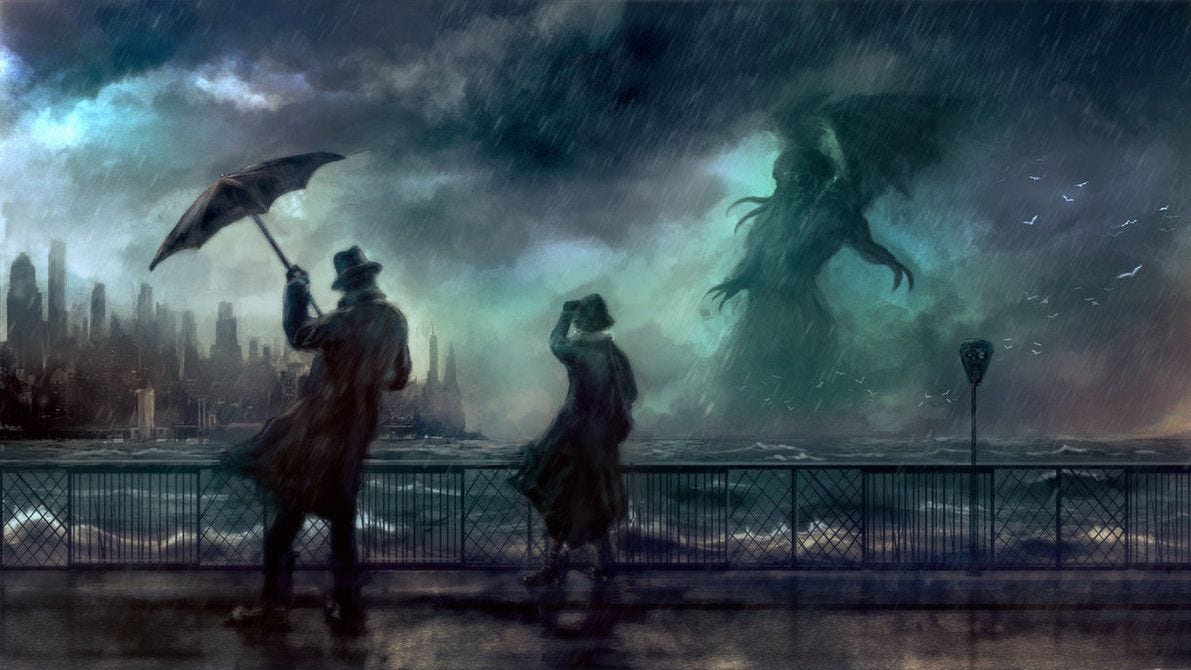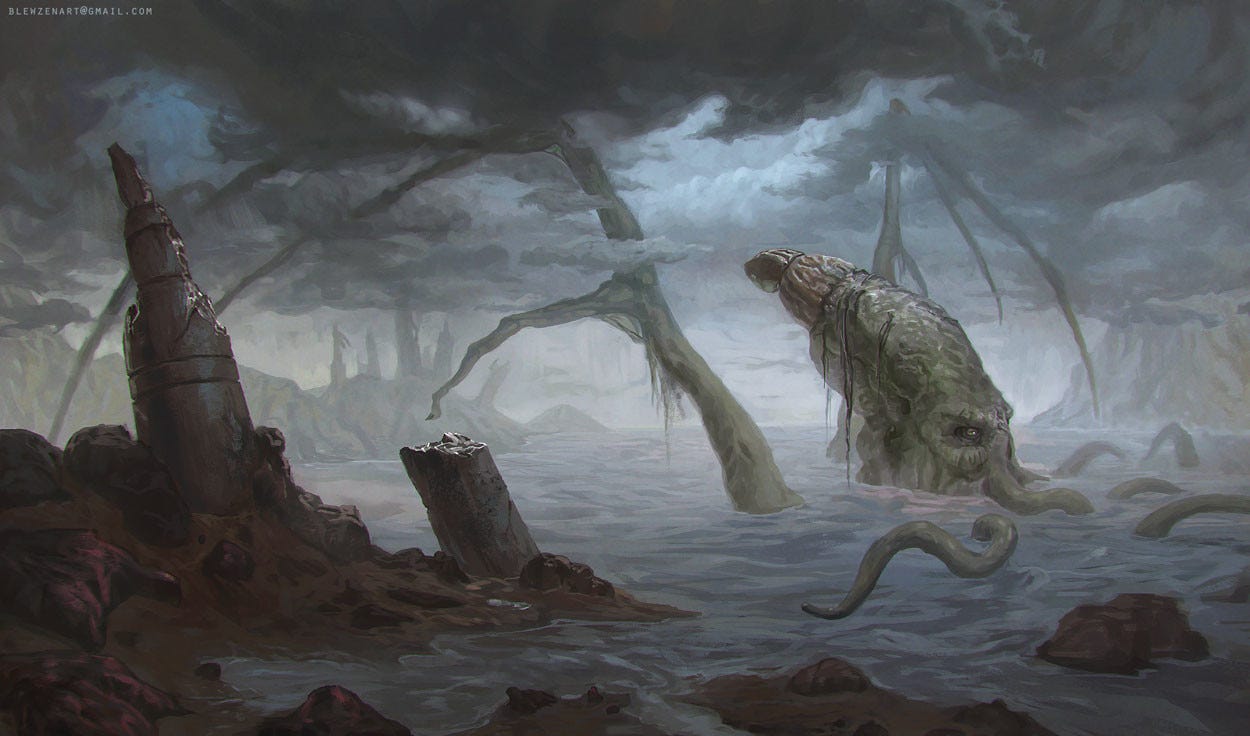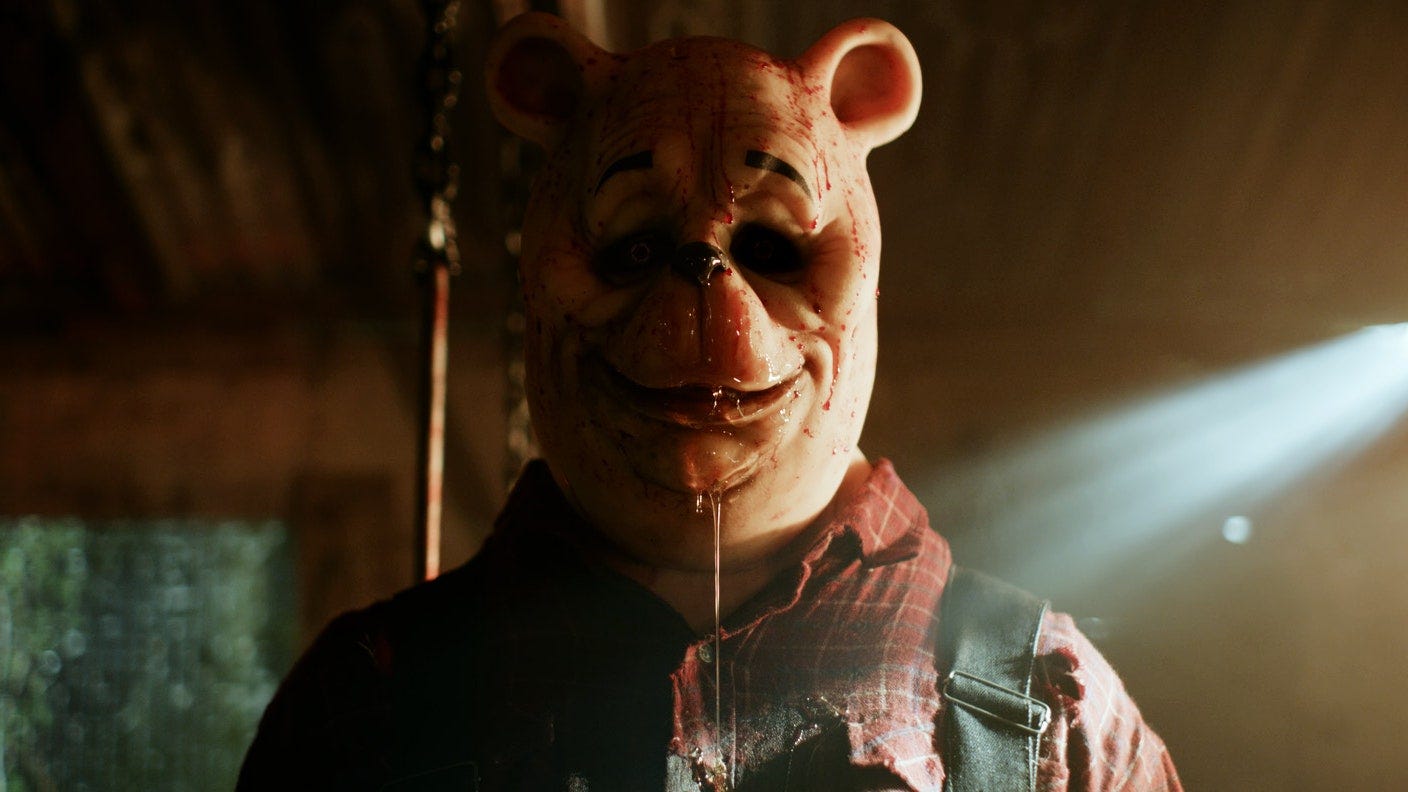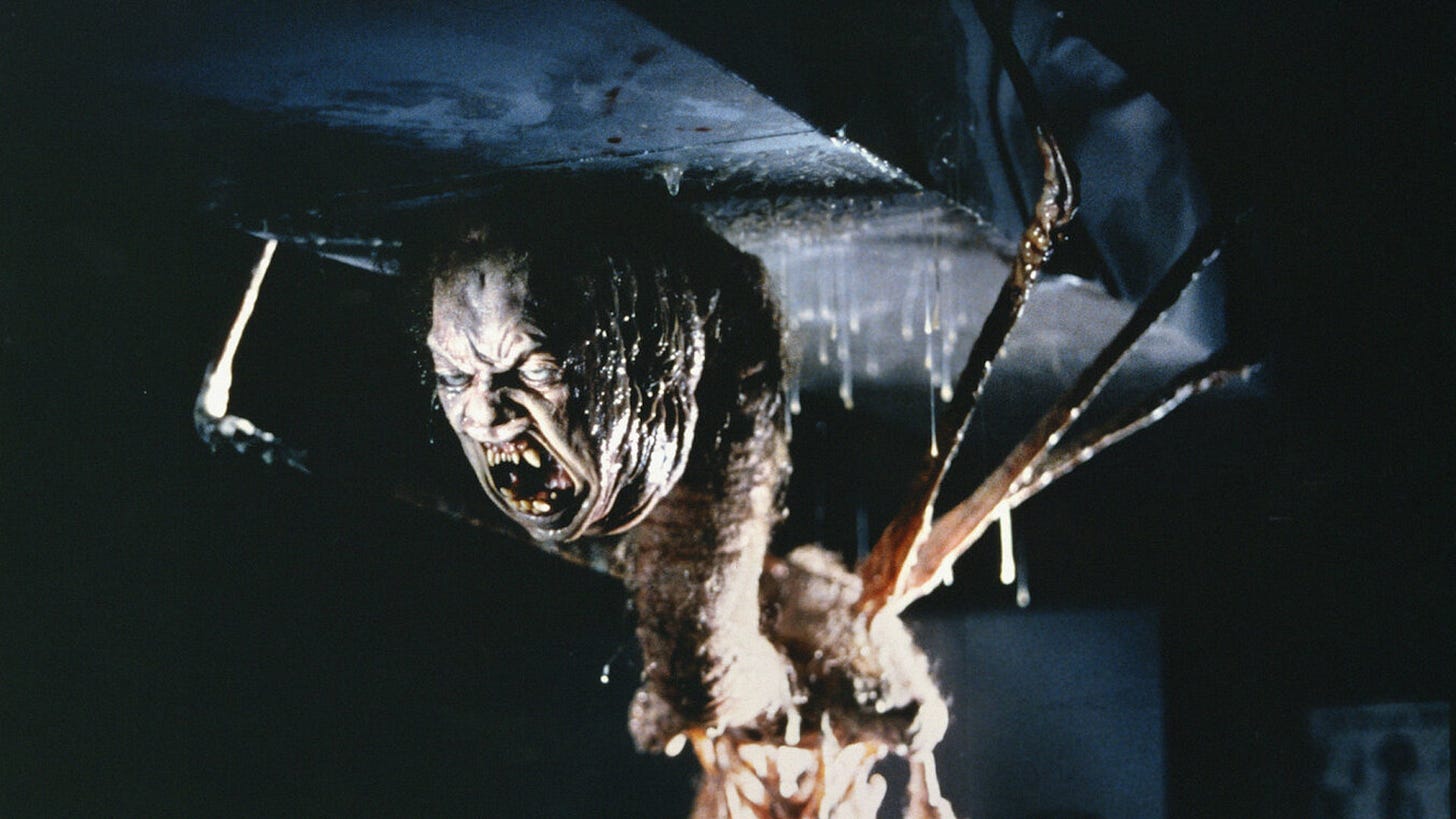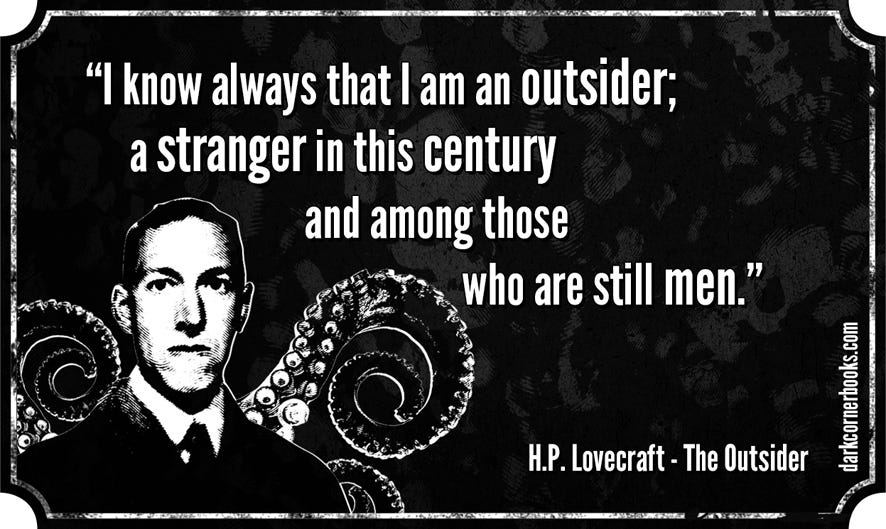“The last I saw of Count Dracula was his kissing his hand to me, with a red light of triumph in his eyes, and with a smile Judas in hell might be proud of.” --Bram Stoker
There’s a strange duality between science fiction and horror, little remarked upon. Sci-Fi has been (until very recently) the genre of the progressive. In nearly all of its wants and ways, it speaks the language of relativism: with the individual, society, and God. In science fiction is the belief that technology can solve humanity’s ills, and the great question of mankind is merely an issue of mechanical optimization.
That isn’t to say there aren’t foundational reactionary works in this genre, but those cases are an explicit rejection of a frame already long set. Dune and other such texts stand out because they are rocks jutting out of a sea of progressivism. For every Starship Troopers, there are a dozen 2001: A Space Odysseys.
But in horror we see the inverse. It is the progressive who now struggles with the reactionary. I distinctly recall in the early 2010s when the Left was desperate to rehabilitate H.P. Lovecraft, and if the Left still bothered to read books, hundreds of classic authors would be in the same position. However, it is not merely that horror authors are reactionary. The language of horror itself eludes the progressive because it is the language of transgression.
The horrific is the debasement of the sacred and the consequences unleashed as a result. It is a plunge into sin and the nature of this fallen world. As a relativist, the progressive denies the existence of both the sacred and the sin. Hell is where the cool people go. Heaven is for the fops and prudes. The progressive cannot engage in a world where there are consequences for their own actions. And while they can create horror stories, the horrific always turns as an indictment against them.
I want to make the argument that there are actually two distinct sub-genres which we conflate when we refer to horror. The first I shall call tragic horror. This encompasses most of the classic works, such as Dracula, Frankenstein, and other such novels. Tragic horror is distinguished by trying to get at a point. The protagonist may be doomed, but there is a lesson in the chaos. There is a question that has an answer, even if it is not spelled out. Tragic horror has a notion of the sacred in the same way a shadow is cast by a flame. It is constantly alluding to an ideal.
The second form of horror is what I’m going to call demonic horror. Though nihilism is certainly present in this genre, what firmly separates the masters, such as Lovecraft, is the praise of degeneracy and often an insatiable malice. Lovecraft wrote his great texts horrified at them himself. That is not present in the modern author. Subversion is treated as proper. Heaven is all but absent and Hell abounds. Carnage and gore are sought after for their own sake. Humanity is loathsome and powerless and no different from the demonic entities that torture them. These are stories that are only useful in what they tell us about the author’s psyche.
To properly illustrate this difference, I want to examine a classic horror story that has been modernized into a romance narrative. The Shadow of Innsmouth is one of the most highly regarded of Lovecraft’s stories. It follows a young man investigating a dilapidated fishing town, only to discover that the town has made an unspeakable pact with fish monsters and interbred with them. This leads to children who look normal, but will slowly acquire fishlike traits and become a Deep One later in adulthood.
The people of Innsmouth grow annoyed at this stranger’s investigations and drives him out. The narrator hides as the Deep Ones surface in a terrible procession, looking for him. Our protagonist eventually escapes, but realizes with great disgust that he is descended from Innsmouth stock. The story ends with him beginning his horrifying transformation.
Weaved throughout this story are themes of contamination, the sins of the father falling upon the son, and the most untouchable idea to the Left, the idea that blood constitutes an essential part of your being. The progressives don’t believe in contamination and therefore their stories are contaminated. They don’t believe in responsibility and therefore their stories are irresponsible. They don’t believe in a folk and therefore their stories are atomized and textureless. They don’t believe in disgust and so their stories are disgusting.
This neatly takes me to The Shape of Water directed and written by Guillermo del Toro. Mind you, this movie had a box office of a 195.3 million dollars off a budget a hundred times less than that. It received a very strong reception on Rotten Tomatoes with a score of 92%. From all perspectives, this was a very successful movie for a modern audience.
The story follows a mute woman working in a secret military lab. Over the course of the story, she falls in love with a fish monster trapped within. The two escape from the compound with the predictable evil commander, but the woman is critically injured by gunfire. The fish monster covers her with goo that not only heals her wounds, but turns her into an amphibian as well. The story ends with the two embracing and leaving for the ocean.
You’ll notice the complete inversion to Lovecraft’s work. Where Lovecraft views the inhuman, the modern views with sympathy. Where Lovecraft views the disgusting, the modern views with sympathy. Where Lovecraft views the immoral, the modern views as delightful. Condemn Lovecraft as a nihilist, but at least Lovecraft had the virtue to view evil as horrific. His writing is saved by his honesty. He may have thought the world was doomed, but he did not celebrate it.
I don’t know if there’s a word for furries except for fish. I know there’s such a thing as scalies. Maybe that’s close enough? But this whole story is a scalie fetish lightly disguised as a romance. Now I’m not against anthropomorphization, but I have to firmly draw the line when I know this is someone’s masturbation fantasy. There’s no metaphor here. The woman literally has sexual intercourse with a fish monster. Unlike Beauty and the Beast, where the woman finds the man in the monster, this time the woman becomes just as monstrous as the man. And yes, that should fill you with revulsion. If your disgust instincts aren’t kicking in, here’s the fish monster in question.
If that is not worse enough, the movie is also filled with the woke nonsense you are already familiar with. How could it not? Hollywood is not content with its propaganda. Even when it engages with bestiality, it cannot ignore the message. I regard pornography as the lowest of the low, the most sinful of the lustful sins, but it somehow seems even less dignified when it lectures to you. At least the porn addict is abusing a drug, but what happens when the drugs are lecturing to you about their sense of superiority?
The Rightwing writes horror stories to scare and disgust. The Left write horror stories that are horrific in their nature as stories being told. There’s no good here. All you can do is hope the author gets some help, but these authors are receiving tens of millions for their sexual fantasies.
Dostoevsky once wrote that beauty will save the world. What he also meant was that people will flee from ugliness. The Left denies ugliness as a premise. It is central to their beliefs. It is why so many of their stories are viscerally ugly, but more than that, it means they cannot properly articulate the language of horror. They cannot understand transgression, for there is nothing that they have which is transgressive, except that which impedes them in their degeneracy. What is this world we find ourselves, where restriction is viewed as a curse and sin is viewed as liberation?
But what this thankfully means is that they are adopting our frame when they attempt to write horror stories. The genre of horror betrays them at every level. Either they produce a Rightwing movie, or they produce something demonic which indicts them as storytellers. They cannot do otherwise. The only objectionable thing in their eyes is what objects against them. How many villains now ring true and how many heroes are flailing with their own beliefs? Their stories are riddled with self-doubt, and they have the audacity to condemn the rest of the world.
The Right knows horror in contrast to light. The Left knows horror because it is in of itself horrific. The only question is the degree to which they are able to hide it. Horror is a very valuable tool because with this genre we can critique the Left, and they in turn cannot critique us. It is with disgust as well as beauty we will win the culture war.
The horror fiction of the next few decades is going to chip away at the Left by dragging everything out into the open. This will be the easiest century in all of history to write horror as one only needs to look at the modern world.
For the first time in many decades, we are finally going to advance, and they are going to retreat. How can they not? There are no more true believers in the Left. There are only cynics and those fearful to let go of a dead world. The dream is dust, and worse, ugly and putrefying. One only needs to take a close look at transgender surgeries to see the lies fall apart. It’s enough to spawn ten thousand horror stories. You cannot look at the results without becoming physically sick.
They carve up their own flesh to make themselves into mannequins. They sacrifice their children on an altar of free sex. They build themselves tombs of plastic toys and fake idols. Everything good is inverted into evil. Everything life giving is inverted into death. They castrate themselves and proclaim that they will reign for eternity.
The Right only needs to observe this. They need careful and expensive propaganda to keep themselves legitimate. We only need to open the blinds and look at our front lawn. There is a generation of artists coming who will only need to look at the world as it is happening around them. The Truth has been laid bare on every street corner, every gas station, and every McDonalds. What more could you want as a writer?
There is a new genre on the horizon. It will be different from cyberpunk as the latter unintentionally glorifies the techno society. What is coming next will not be the shuddering banality of Kafka nor the totalitarian depression of Orwell. What is on the horizon is what I’m going to term as anarcho-horror (feel free to come up with a better name). As the systems are collapsing, what is ahead is chaos.
Anarcho-horror will be defined not by a totality of one system but a fracturing of many powers in a still technological landscape. As people rightly move away from science, we will still, for a time, have access to the tools of our ancestors. I can see cults forming around AI personas of the dead. I can see people performing self-experimentation with CRISPR, or worse, experimentation on others. I can see pornographic torture, once behind closed doors, now conducted on the street for a titillated audience. Already these things are happening in their infancy. My predictions are not wild, but I’ll leave it to other authors smarter than I to visualize.
The point of anarcho-horror is chaos. All the rules we thought we knew about the digital landscape and technology are going to collapse. Will we see human sacrifices for the water treatment gods? Will the next Mongol horde ride with machine guns mounted on trucks? Will witch doctors prescribe pills to hideous effects on their victims? Maybe. All I know is that the world is going to look a lot more like Book of the New Sun rather than Star Trek, complete with a Guild of Torturers.
But anarcho-horror will not just be a lamentation of times long gone. It will be a direct confrontation of chaos, and a guide for navigating these troubled times. It cannot be the demonic horror of the Left because no one will be able to stomach it, seeing so much violence and cruelty already. Anarcho-horror will point to the antithesis of chaos, which is justice and order. If there is to be a new regime, it must articulate itself as such, and the new class of elite will produce art to that effect.
Putting aside my admittedly fallible predictions of the future, I want to give some advice for would-be reactionary authors. There is a balance that needs to be struck in the horror genre. We cannot go to further and further extremes in depicting depravity. In those works, the degeneracy can easily overwhelm the reader consuming it. Yes, there is room and a necessity for extreme content, but it must always be mediated by the good of the person consuming it. Your goal is not to wallow in bleakness, as that is both bad for your soul and for your fiction.
Your tools in regard to such sensitive materials are allusion and metaphor. First, graphic description of extreme depravity must be used with prudence so as to not poison the mind. However, you can still talk about and give commentary on these topics around the edges. In fact, it lends to your story as people naturally shy away from the graphic. Second, allusion is often more powerful than description. Horror stories are at their most effective when readers are imprinting their own fears into the shadows.
When you write horror, always keep in mind that you must write from a love of the sacred and not a love of the horrific. You are not a deconstructionist, at least not a deconstructionist of the good, the true, and the beautiful. There’s a really disgusting phenomenon among the Left where they will take children’s properties and turn them into horror movies.
Winnie the Pooh: Blood and Honey had a box office of 5.2 million dollars. I won’t bother with the plot summary. You already know what it is. But this movie was successful enough to spawn its own cinematic universe with upcoming horror adaptions of Bambi and Peter Pan. Now I’m not saying Winnie the Pooh is sacred, but it is innocent. The Left cannot stand innocence as innocence condemns vulgarity, and so this movie was made as a cheap joke for a cheaper audience.
In a sense, this is the only way the Left can get a hollow win from horror movies. It can torch properties for clout and outrage by wearing characters and settings as skin suits. But this process is fundamentally unsustainable, and it will do them no favors in the long term. What do you make of a culture that produces only ugliness?
The reactionary author must be a deconstructionist of deconstruction. He must be building and never tearing down. It is only in defense of the sacred and pure, that the greatest horror stories are told. It is the contrast, the clash of light and dark, which allows the reader to safely enter the darkest of nights as he is assured of a brighter day. You can and often should subject your protagonists to the most harrowing of ends, but never do this to your reader.
I want terrifying. I want stories that will keep me up at night. I want every manner of ghoul and specter that haunts the night. What I do not want is the stories that summon those very monsters into my room. For those books, I shall reserve the bonfire.
For my fellow Christians who take umbrage at this approach to literature, preferring we do not depict sin nor horror at all, I wish to say that I respect your boundaries. It is up to each person for the salvation of their own soul, and you have every right to curate the content you consume. However, trying to reduce all art to these sensibilities is to lie.
“Writing a novel is a terrible experience, during which the hair often falls out and the teeth decay. I’m always irritated by people who imply that fiction is an escape from reality. It is a plunge into reality, and it’s very shocking to the system.” --Flannery O’Connor
There is a reason why the Protestant Evangelical movies garner a terrible reputation and not just because they were lambasted by atheists. In trying to create a world without sin, you are forced to brush over or obfuscate details. We live in a tragic and sinful and fallen world and to ignore that fact is to put up a false pretense. Fiction is a discussion between an author and his readers, and we cannot have that discussion if we cannot brooch the basic reality of sin and its consequence. There is not a more important conversation we can have than combatting evil.
Yes, there will be those who will use this argument in bad faith to justify their degeneracy and their perversion. There will always be those who try to justify pornography with beauty, carnage with realism, and nihilism with tragedy. But of those bad actors, let God sort them out. And for the rest of us, do not blindly muzzle for the sake of comfort. Truth is found on the Cross, and we cannot shy away from that reality.
The story is Christianity is a comedy drawn from great tragedy, and we should not neglect this fact.
I end this essay with an exhortation. Never lie. Whatever genre you find yourself writing, shout the Truth from the rooftops. Beat your chest and proclaim that which men are frightened to say. And I do not mean your truth or his truth or their truth. I mean The Truth in whatever way you are gifted to express it. It is only in this we shall claw our way back to sanity and a better world.

